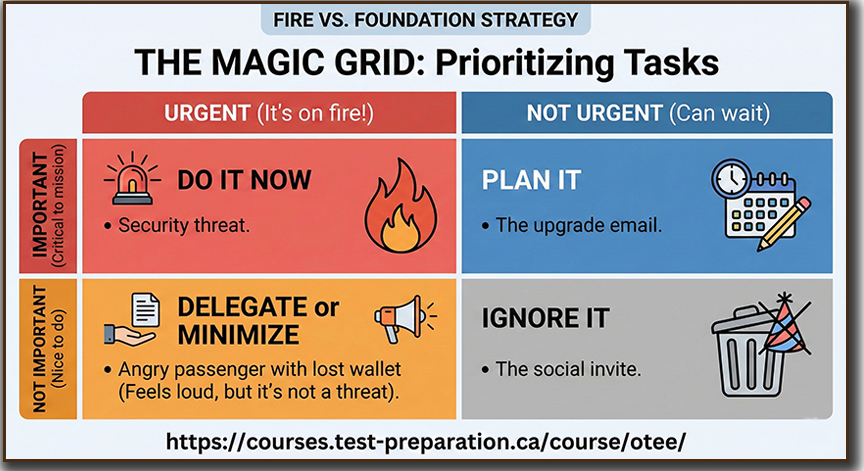Prioritizing Tasks
- Posted by Brian Stocker
- Date July 11, 2024
- Comments 0 comment
Ever feel like you need eight arms to do your job? We’ve all been there. You’re five minutes from the end of your shift, the phone is ringing, a traveler is upset about a lost bag, and suddenly a security alarm trips at Gate 3. In the real world, you might just panic. But on the CBSA or other standardized tests, panic isn’t an option—it’s a wrong answer.
These questions aren’t just testing if you know the rules; they are testing if you can keep your cool and spot the difference between a ‘right now’ problem and a ‘right later’ problem. Let’s learn how to sort the noise from the necessity.
How to Answer These Questions (The Criteria)
The “Fire vs. Foundation” Strategy To answer these questions correctly, don’t rely on your gut feeling. Your gut wants to help the crying passenger (the wallet scenario). Your brain needs to follow the matrix.
Ask two questions for every scenario:
Question 1: Is it on fire? (Urgency)
Yes: It requires immediate attention right this second (e.g., a security breach, a medical emergency).
No: It can wait 20 minutes without exploding (e.g., filing a report, answering an email).
Question 2: Does it crumble the foundation? (Importance)
Yes: It is critical to the core mission (National Security, Safety, Law).
No: It is nice to do, but the country is safe without it (Customer service, social events, minor admin).
The Magic Grid:
Urgent + Important: DO IT NOW (Security threat).
Urgent + Not Important: DELEGATE or MINIMIZE (The angry passenger with the lost wallet—it feels loud, but it’s not a threat).
Not Urgent + Important: PLAN IT (The upgrade email).
Not Urgent + Not Important: IGNORE IT (The social invite).
Prioritizing Practice Questions
Explanations Summary
Urgent/Important: Requires immediate action due to security concerns.
Urgent/Not Important: Needs timely attention but does not impact broader security or operational duties.
Not urgent/Important: Important for records and accountability but can be addressed after urgent matters.
Not urgent/Important: Important for future planning but not immediately pressing.
Not urgent/Not Important: Neither immediate nor critical to current operational needs.

The 2-Minute Pressure Cooker: Can You Focus in the Chaos?
The Reality: It is easy to be a genius when you are sitting on your couch with a cup of coffee and all the time in the world. But the actual job of a Border Services Officer doesn’t happen in a quiet library. It happens in a noisy, high-pressure environment where “peace and quiet” doesn’t exist.
Imagine this: The radio is squawking in your ear, a toddler is crying in the lineup, your supervisor is waving for your attention, and you still have to look a traveler in the eye and decide: Is this a threat, or just a distraction?
The Exercise: That is why we built the 2-Minute Pressure Cooker. We aren’t just testing your book knowledge; we are testing your nerves.
The Mission: Below are 8 Scenarios.
The Clock: You have exactly 120 Seconds to clear the board.
The Challenge: That gives you just 15 seconds per decision. That is just enough time to read, think, and click—but no time to second-guess yourself.
Take a deep breath. Ignore the imaginary noise. Let’s see if you are ready for the shift.
Prioritization Practice Questions
A Border Services Agent is working at a busy airport in Toronto. He encounters the following situations that require his attention and decision-making:
1. An individual on the no-fly list has just arrived at the border crossing and is attempting to enter the country. How would you classify this task?
a. Urgent/Important
b. Urgent / Not important
c. Not urgent / Important
d. Not urgent / Not important
2. A passenger is frustrated because they left their wallet on the plane and need assistance retrieving it. How would you classify this task?
a. Urgent/Important
b. Urgent / Not important
c. Not urgent / Important
d. Not urgent / Not important
3. A monthly report on the number of processed travelers needs to be compiled and submitted. How would you classify this task?
a. Urgent/Important
b. Urgent / Not important
c. Not urgent / Important
d. Not urgent / Not important
4. An email arrives about a planned upgrade to the border security system next quarter. How would you classify this task?
a. Urgent/Important
b. Urgent / Not important
c. Not urgent / Important
d. Not urgent / Not important
5. A colleague invites you to join a social event after work. How would you classify this task?
a. Urgent/Important
b. Urgent / Not important
c. Not urgent / Important
d. Not urgent / Not important
6. You are working at the international arrivals terminal at Pearson International Airport. A passenger arrives from a country known to have recent outbreaks of a contagious disease. The traveler appears visibly unwell, sweating and coughing.
How would you categorize this situation?
a. Urgent/Important
b. Urgent / Not important
c. Not urgent / Important
d. Not urgent / Not important
7. When questioned, a traveler declares he is carrying several items of high-value jewelry worth over CAD 10,000, but does not have proper documentation for them.
How would you categorize this task?
a. Urgent/Important
b. Urgent / Not important
c. Not urgent / Important
d. Not urgent / Not important
8. How would your categorize the inspection of the traveler’s luggage containing high-value jewelry?
a. Urgent/Important
b. Urgent / Not important
c. Not urgent / Important
d. Not urgent / Not important
1. A
Urgent/Important Explanation: This situation requires immediate attention due to the potential security threat posed by the individual. It is urgent because of the immediate risk, and important because it involves national security and safety concerns.
2. B
Urgent/Not Important Explanation: While the passenger’s concern is urgent to them and requires timely customer service, it does not impact border security or operations. Therefore, it is urgent but not important in the larger context of Agent Turner’s duties.
3. C
Not urgent/Important Explanation: This report is important for maintaining accurate records and performance metrics, but it does not require immediate action. It can be completed after more urgent matters are addressed.
4. C
Not urgent/Important Explanation: The planned upgrade is important for future operations and efficiency but does not require immediate attention. It can be scheduled and planned for in due course, making it important but not urgent.
5. D
Not urgent/Not Important Explanation: While social events can be beneficial for team morale, they are neither urgent nor crucial to the immediate operations of border security. Therefore, this action is not urgent and not important.
6. A Urgent / Important
This action is classified as Urgent/Important because the symptoms suggest a potential public health risk that requires immediate attention to prevent the possible spread of
a contagious disease.
7. C Not urgent / Important
This is important but not particularly urgent.
8. C
This action is classified as Not urgent / Important because while it is crucial to document and inspect high-value items, it can be done methodically after addressing the immediate
health concern.
How did you do?
Finished in under 80 seconds?
Rating: Command & Control. You have the speed of a veteran. But be careful—speed without judgment is dangerous. Check your score: Did you rush and miss the nuance in Question #7? If you got 8/8, you’re ready. If you missed a few, slow down and read the room.
Finished in 80–110 seconds?
Rating: Solid Contender. This is the “Sweet Spot.” You aren’t rushing, but you aren’t hesitating either. You took about 10-12 seconds per situation, which is exactly the steady rhythm needed for a full shift at the border.
Didn’t finish? (Or barely made it?)
Rating: Analysis Paralysis. You are likely “over-reading” the scenarios. In the real test, you don’t have time to worry about the passenger’s backstory.
Don’t worry—most people start here! Practice scanning for Trigger Words (e.g., “Threat,” “Weapon,” “Medical”) to make your decision faster.
Choose How You Want to Study
Option 1: The Full Experience (Best Value)
Online Course + Interactive Quiz
✅ Tutorials & Videos
✅ Hundreds of Interactive Questions
✅ Auto-timed Quizzes
✅ Includes Free Assessment
✅ Over 700 Questions
Start Course Now
Most popular choice
Option 2: Instant Access – PDF Download
Practice Workbook (PDF)
✅ Download immediately
✅ Print at home
✅ Searchable text
Download PDF
$24.99 – Instant Delivery
Option 3: Physical Book
Paperback Version
✅ Traditional study style
✅ Take notes in margins
✅ Shipped via Amazon
Buy on Amazon
Order via Amazon
Anatomy of a Wrong Answer
Maybe you know the right answer but get tricked by the “distractor.” This explains the trap.
Scenario: A Passenger has lost their wallet and are very frustrated and agitated. How would you classify this task?
a. Urgent/Important
b. Urgent / Not important
c. Not urgent / Important
d. Not urgent / Not important
The Trap Answer: Urgent/Important
Why it feels right: As humans, we are wired to help people in distress. The passenger is right in front of you, they are loud, and they are upset. It feels urgent because the social pressure is high. It feels important because good service is a value we all hold.
Why it is WRONG: In the context of a Border Services Officer, “Importance” is defined by National Security and Safety, not customer satisfaction.
- Does a lost wallet threaten the border? No. (Not Important).
- Does the passenger need help now? Yes. (Urgent to them).
The Verdict: By choosing “Important,” you have prioritized a wallet over potential security threats.
You failed the mission test.
The correct classification is Urgent / Not Important.
Written by, Brian Stocker MA.,
Published by, Complete Test Preparation Inc.
Updated:Thursday, January 8th, 2026
Published: Thursday, July 11th, 2024
Created by Brian Stocker and the team in Victoria, BC.
Helping students succeed since 2005
Got a Question? Email me anytime - Brian@test-preparation.ca
You may also like
Police Problem Solving for SSPO and OACP Test
Police Problem Solving: Rule Application (Deductive Logic) This section of the SSPO (Sigma Survey for Police Officers) and OACP certificate process measures your ability to apply a general rule or a policy to a specific real-world situation or scenario. This …
Toolbox Math – Basic Math for Trades
Basic Math Practice Questions for Canadian Trades Trades Entrance Canada Trades Alberta Trades Skilled Trades Readiness
CELPIP Writing Prompts
The CELPIP writing evaluates your ability to communicate effectively in written English different tasks. Here are some sample CELPIP Writing prompts for writing an exmail. You are given a prompt and a scenario. Your email may be formal or informal, …

